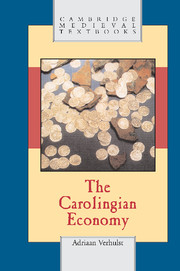2 - Demography
Published online by Cambridge University Press: 05 June 2012
Summary
Conjectures about the demographic situation and evolution in Carolingian Europe have been based mainly on four polyptychs containing demographically usable data such as names, figures, family structure and even age of tenants, inhabitants and dependants of manors. They are, in order of importance of the information, the polyptych of the abbey of St Germain-des-Prés under abbot Irmino (825–9), of the abbey of St Bertin (844–59), of St Remi de Reims under archbishop Hincmar (middle ninth century) and of St Victor de Marseilles (813–14). Their value in this respect has been much criticised, most severely by Léon-R. Ménager, but the studies by Jean-Pierre Devroey of certain aspects of their redaction have cleared the way for a synthesis by Pierre Toubert which has met a large consensus.
Being static documents polyptychs give a snapshot picture of some demographic aspects of a manor, some of which, however, are elements of a dynamic mechanism. This is, for example, the case of the ratio of adults to children, especially female adults, from which conjectures about future growth or stagnation of the population can be made. Using such data one must look out for possible and in fact frequent over- or under-representation of some categories of the population. Duby, for example, concluded erroneously that stagnation and even crisis characterised the demographic evolution of the manor of Villeneuve-Saint-Georges. He then, in combination with other factors, generalised this conclusion. Devroey has since proved that the number of children and women in the polyptych of Irmino has been under-represented.
- Type
- Chapter
- Information
- The Carolingian Economy , pp. 23 - 28Publisher: Cambridge University PressPrint publication year: 2002



